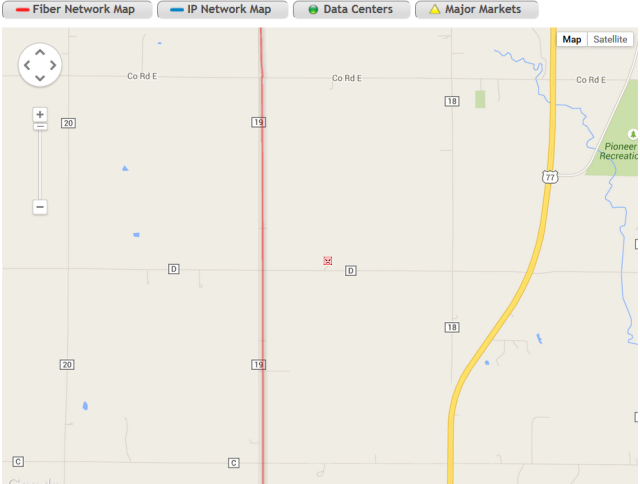
Internet service providers often charge thousands or even tens of thousands of dollars to extend their networks to people outside their service areas.
But it turns out construction costs passed on to customers can be much, much higher. When the operator of a family farm in Nebraska requested fiber service from the local DSL Internet and phone service company, he found out that he’d have to pay an incredible $383,500 to subsidize the ISP’s construction.
That’s the price estimate Windstream Communications provided to the Norman R. Schneider Family Trust Farm in Ceresco, Nebraska, after CTO Nelson Schneider contacted the company about getting fiber service to replace his DSL.
Fortunately, it looks like Schneider will get fiber service for a fraction of that price from a second network provider called Northeast Nebraska Telephone Company (NNTC). Even though the Schneider farm is completely outside NNTC’s service area, even for copper, NNTC told him it would build the fiber line for a more reasonable $41,915.88.
While nearly $42,000 is still a lot, Schneider noted that “it is a one-time investment that will enhance my quality of life and property value significantly.”
What isn’t clear is why Windstream would charge nine times as much as NNTC. Ars contacted Windstream, which confirmed the $383,500 price, saying “the total quoted was for 36 months of dedicated Internet service.”
We also asked Windstream how it calculated the estimate but did not receive an answer.
Windstream has about 1.1 million Internet subscribers and just announced that it's getting $175 million a year for the next seven years from the federal government to bring 10Mbps Internet to 400,000 rural locations in 17 states. That money is from the Connect America Fund, which is paid for by surcharges on Americans' phone bills.
This isn't the first time Windstream has received money to improve Internet service in areas like Schneider's, but it hasn't helped him yet. "I called them out on it once. They said they'd 'already spent all of it,'" he said.
Windstream told Schneider that he would have to pay to run fiber about 4.5 miles from its facilities to his property, “but it's actually 3.5 miles from town, which is the same distance it is to Northeast Nebraska's nearest fiber node,” he said. (NNTC told Schneider in an e-mail that he was "about 3 miles from our nearest fiber connection.")
Strangely, Schneider said there is what appears to be a Windstream fiber line about a quarter-mile from his property. A map of Windstream’s fiber network seems to confirm its location.

“They refuse to connect me to that,” he said. “They tell me that it's some sort of reserved, private Windstream-only line.”
Windstream did not respond to questions from Ars about this apparently unavailable fiber line.
Excruciatingly slow DSL makes Internet use tedious
The farm, built by Schneider's parents in 1979 (the year he was born), is about 22 miles from the state capital of Lincoln. While the property has a Ceresco area code and zip code, it’s technically outside the city limits. But the farm is in Windstream’s copper service area, and Schneider pays the company $80 a month for phone service and extremely slow DSL Internet, he told Ars.
Schneider’s Windstream service is supposed to provide 1.5Mbps download speeds and 310kbps upstream. For about two years, the service consistently provided what was promised, he said. But recently, speeds dropped to about 512kbps down and 256kbps up, and Windstream hasn’t been able to get it back to where it used to be, he said.
“They are continually telling me there's nothing wrong with it,” he said.
With speeds of just half a megabit, “it makes everything just tedious,” Schneider said. “Any site that has graphics is tedious. It makes it difficult to check the grain prices online because everything loads so slowly. None of that is just pure text, it’s all scripted, it's not fast at all. I don’t think anybody really appreciates how much the Web has changed since 512kbps was considered fast.”
Downloading operating system and software updates is especially difficult, he noted.
-
The Norman R. Schneider Family Trust Farm.Nelson Schneider
-
One of the Schneider farm's corn fields.
Schneider’s family used a fixed wireless service for a couple of years, but the speeds were about the same as Windstream, and the provider “complained constantly that I was using too much bandwidth,” he said.
Schneider has considered satellite Internet, “but the latency and severely low data caps aren't good value for the cost, and I refuse to ever pay the outrageous per-gigabyte overages most such outfits charge,” he said.
Schneider’s current Windstream service is residential, but Windstream’s website advertises business-class Internet service in Ceresco with speeds up to 40Mbps and prices starting at $39.99 a month. The farm is a business, so Schneider tried to get that business-class service, but he had trouble just getting Windstream to listen.
Schneider filed a complaint against Windstream on the Federal Communications Commission's website, he said, and “by going through that channel I was actually able to get Windstream to contact me to talk about replacing DSL with something better.” Schneider isn't the first Internet customer to find that providers are more willing to compromise when you complain to the government, but going through Windstream was still a dead end.
At one point, a Windstream salesperson told Schneider that it would cost $20,000 to get a fiber line. That turned out to be “overly optimistic,” in Schneider’s words. Ultimately, Windstream wouldn’t budge on the $383,500 cost.
The company also did not promise Schneider any particular speed. “They have been extremely reticent to tell me what kind of maximum speeds they'd offer,” he said. “The highest quote I've gotten from them is 10/10 [10Mbps both downstream and upstream] on speed.”
Fed up, Schneider contacted NNTC in June. He had learned about NNTC running fiber to farms in its service area, which wasn’t that far from his own. After exchanging a few e-mails with company representatives, an NNTC executive visited Schneider because “he wanted to drive the proposed fiber route and stopped by to discuss it while he was in the area.”
Northeast agreed to let Schneider pay for the construction in three annual payments of about $14,000 each, and it will provide 50Mbps download speeds and 15Mbps uploads for $100 a month, he said. (UPDATE: After this article published, Schneider learned that the package will instead be $140 a month for 25Mbps both downstream and upstream. The $41,915.88 construction cost remains the same.) Northeast also agreed to a $6,000 credit for any other customer “that signs up using the line I'm paying to install.” The necessary paperwork is being finished up this month.
“They said they'd have to order the fiber cables, but should be able to get me set up by the end of September of this year,” he said.
Schneider was pleasantly surprised by how easy it was to deal with NNTC after his experience with Windstream. While nearly $42,000 for Internet service is still much more than most people would have to pay, Schneider is happy to make the investment.
“I look at it like buying a nice new car, only instead of taking me places on the paved highway, it will finally allow me to drive the Information Superhighway at the speed limit,” he said. “Right now I feel like an Amish horse-drawn carriage when doing anything online."
reader comments
224